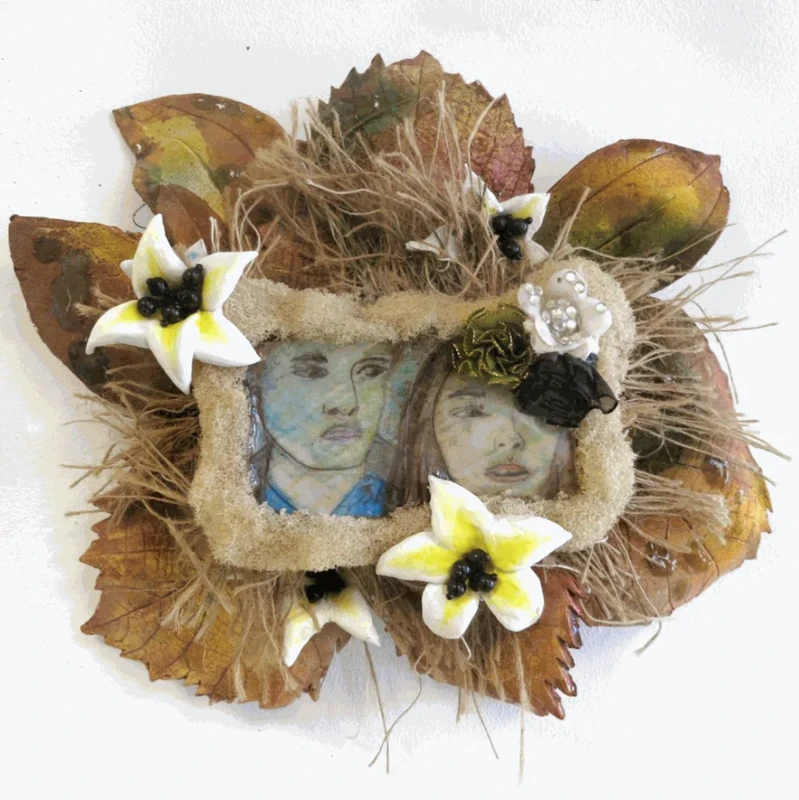Alya Hatta: A soft place to land
7 Nov-30 Nov 2024


Alya Hatta’s practice reflects her nomadic childhood between Malaysia, the UK, the Indonesian archipelago, Saudi Arabia and Dubai. Her work begins by delving into her vast personal archive which includes everyday phone photos, evocative pictures and music videos found through casual Internet surfing, the British Museum’s online archives and the forever fervour of the family WhatsApp group chat. These materials come into focus through a diasporic lens, from Southeast Asia to Southeast London, signifying stable identification as eternally elusive.
Hatta cites this fragmented sense of identity as the reason behind her modus operandi of synthesizing diverse physical and psychic materials to produce her collaged canvases. Her tangible working materials are similarly sourced through a methodology of meaning. She primarily uses materials that come to her through her network of friends and family in Southwark and Malaysia (plus her local cycle mechanic, Bob).
After this extensive planning and gathering stage, her material approach takes a labour-intensive turn, as patience gives way to a complex craft in the canvas fabrication process. She stitches together disparate fabrics, loosely informed by digital compositions, to create painting substrates from calico, hessian, batik, tarp, burlap, denim, suede, satin, and wool. Bike chains or leaves coated in latex playfully distort the everyday. Her painterly approach is akin to drawing with paint, as rapid-fire marks balance out the extended time spent building her networked surfaces. Hatta’s materials and marks are exuberant in presence while perpetually pointing to an exciting elsewhere.
In addition to her large-scale paintings, Hatta presents miniature paintings and objects based on the artefacts in the British museum, creating a stark contrast in scale. While the paintings are portals into multiple moments, the miniature paintings are a single unique second, condensing historical chronicles into souvenirs of the diasporic world. Similarly, her Family Tree plant sculptures are a paradoxical synthesis of organic matter and digital manifestation. Using the plant itself as the internal structure of the sculptures, Hatta combines original and reproduction into uncanny objects. Floral forms are printed directly from plant leaves found in Burgess Park or near her house in Malaysia, connecting distant geographies through poetic process.
Working with technical collaborator Kiran Hosein, these sculptures use Arduino (a microcontroller) to send out pulses and listen for echoes activated by the presence of the gallery visitor. The plants enter into dialogue with each person and their fellow plants, producing a symphony of sounds collated from her family members over their family WhatsApp. These works invoke the feeling of being part of a multi-person conversation, harmonizing human with plant and machine.
The title of the exhibition comes from Hatta’s practice as a pursuit of home, of building a soft place to land within her community. To create this feeling of home, each work mythologizes the mundane through her adamantly additive process. Her flamboyantly ornate vision refuses reduction, instead expressing the contrasting complexity in diasporic experience.
Alya Hatta (b.1999, Malaysia) is an interdisciplinary artist based between London and Kuala Lumpur. She completed her BA in Fine Art at Goldsmiths, University of London and her MA in Painting at Royal College of Art (2023). She has exhibited internationally in London, Milan, Kuala Lumpur, Sydney, and Tokyo amongst others. Hatta is part of London-based Southeast Asian artist collective 'Unamed Collective'.
Recent solo exhibitions include: Some Seeds Are Still Bitter (2024), Setareh Gallery, Berlin, Playing Chopsticks at S.E.A. Focus with Yavuz Gallery, Singapore (2023), Up On Stilts at The Room, London (2022), and Ida at Lupo Gallery, Milan (2022). Group exhibitions include White Lodge, Island 83 Gallery, New York, New Now at Art SG with Pi Artworks, Singapore (2023), and Friends and Family II, Pi Artworks, London (2023)
Text by Ian Douglass.